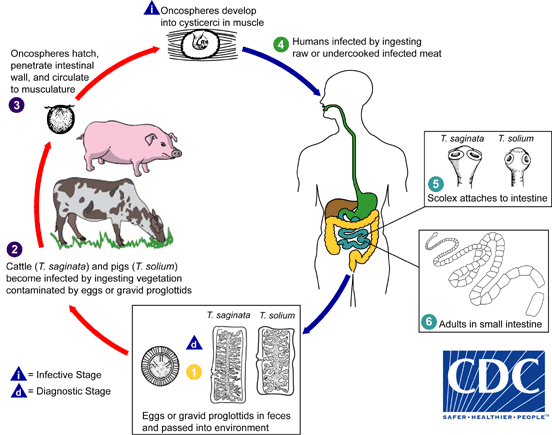Do you eat crispy bacon? Florida man who liked undercooked bacon had tapeworm eggs
A habit of eating undercooked bacon and poor hygiene lead to a nasty discovery.
A Florida man suffering from persistent migraines was found to have festering tapeworm eggs in his brain, according to a report published in the American Journal of Case Reports.
Known as neurocysticercosis, the condition is very rare in the United States.
"It is historically very unusual to encounter infected pork in the United States," researchers wrote. "Our case may have public health implications."
Here's what you should know.
What happened in the Florida case of the man with tapeworm eggs?
A 52-year-old man with a history of migraines and type 2 diabetes told doctors his migraines had been getting worse and happening almost weekly.
He hadn't traveled to any high-risk areas and "denied eating raw or street food."
However, he "admitted to a habit of eating lightly cooked, non-crispy bacon for most of his life."
Tests, including a CT scan and MRI, followed by an infectious disease workup discovered the man tested positive for cysticercosis antibodies, confirming a suspicion of neurocysticercosis.
Treatment followed and the the headaches improved, according to the American Journal of Case Reports.
'Improper handwashing' probably caused tapeworm eggs to end up in man's brain

"Our patient’s lifelong preference for soft bacon may have led to instances of undercooked bacon consumption, but this would have caused him to develop taeniasis, an intestinal tapeworm, and not cysticercosis," according to the American Journal of Case Reports.
Taeniasis is the infection of humans with the adult tapeworm, which happens when you eat raw or undercooked pork and the larval cysts in the meat, according to the Centers for Disease Control.
Cysticercosis is an infection caused by the larvae of the parasite Taenia solium, which occurs after a person swallows tapeworm eggs. The larvae get into tissues such as muscle and brain, and form cysts called cysticerci. When cysts are found in the brain, the condition is called neurocysticercosis, the CDC said.
"It can only be speculated, but given our patient’s predilection for undercooked pork ... we favor that his cysticercosis was transmitted via autoinfection after improper handwashing after he had contracted taeniasis himself from his eating habits."
Signs and symptoms of cysticercosis from swallowing tapeworm eggs
Signs and symptoms will depend on the location and number of cysts in your body, according to the CDC.
Tapeworms can cause digestive problems, including abdominal pain, loss of appetite, weight loss, and upset stomach. The most visible sign of taeniasis is the active passing of tapeworm segments.
Cysts in the muscles
Cysts in the muscles generally do not cause symptoms. However, you may be able to feel lumps under your skin. The lumps sometimes become tender.
Cysts in the eyes
Although rare, cysts may float in the eye and cause blurry or disturbed vision. Infection in the eyes may cause swelling or detachment of the retina.
Neurocysticercosis (cysts in the brain, spinal cord)
Symptoms of neurocysticercosis depend upon where and how many cysts are found in the brain. Seizures and headaches are the most common symptoms. However, confusion, lack of attention to people and surroundings, difficulty with balance, excess fluid around the brain (called hydrocephalus) may also occur. The disease can result in death.
Can tapeworms spread from person to person?
People with taeniasis — a tapeworm infection in the intestine — may spread tapeworm eggs to other people if they do not practice good hygiene, especially washing their hands after using the toilet.
If others then swallow the eggs, cysticercosis could occur and larvae could move into muscle or brain tissues, the CDC said.
Humans swallow the eggs when they eat contaminated food or put contaminated fingers in their mouth. Someone with a tapeworm can infect himself with tapeworm eggs and can infect others in the family.
Is there treatment for cysticercosis?
Yes. Infections are generally treated with anti-parasitic drugs in combination with anti-inflammatory drugs.
How rare are tapeworm infections in the US?
Cysticercosis is found worldwide but is most often in rural areas of developing countries where pigs are allowed to roam freely and eat human feces and where hygiene practices are poor, the CDC said.
Taeniasis due to T. saginata is rare in the United States, except in places where cattle and people are concentrated and sanitation is poor, such as around feed lots where cattle can be exposed to human feces.
This article originally appeared on Treasure Coast Newspapers: Tapeworm eggs found in Florida man who ate undercooked bacon
